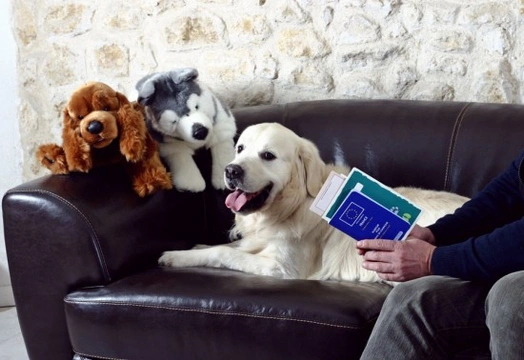
International Travel with Your Pet
Traditionally, travelling abroad with your pet involved long periods of quarantine - six months was common - to ensure that diseases such as rabies did not get brought into the country. This effectively meant that no one really took their pets abroad unless travel was either totally unavoidable or one-way. But in October 2001, the Pet Travel Scheme (PETS) was introduced, meaning that this is no longer the case.
What is PETS?
The PETS scheme is a system through which pet owners can travel with their pets, avoiding the lengthy (and sometimes costly) quarantine measures which had previously been so strict. It was introduced in 2001 to facilitate easier travelling for pets within some EU countries. The scheme was gradually extended to include the USA, Australia and New Zealand. At the point that it was introduced, it was primarily for the benefit of those living in the UK-as the UK had strong safeguards against rabies, one of which being the quarantine mentioned above.In January 2012 the PETS scheme was extended again, to mean that all pet cats, dogs and ferrets can leave and re-enter the UK to and from any country in the world, without enduring the quarantine, providing that certain conditions are met.
So what are these conditions?
Leaving the UKIn order to leave the UK, your pet must be :
- One of the pets listed above.
- Fitted with a microchip.
- Vaccinated against rabies.
- Vaccinated against tape worm.
- Travelling on an approved carrier.
- Booked in well in advance of your flight/voyage.
This all sounds easy enough to do - but don't be complacent. To ensure that all of these are done- and done to the stringent standards required- you need to start preparing your pet 7-8 months before you plan to travel. The 'stringent standards' apply most of all to the health related criteria- for example, in order to prove that your pet has been vaccinated, you need to ensure that the vaccination certificate contains the following information:
- your pet's age (they must be at least three months old) and date of birth
- the date of vaccination
- the vaccine product name
- the vaccine batch number
- the date that the vaccine booster will be due
- the microchip number
You see, therefore, how specific the conditions are, and how precisely you must follow them.Bringing your pet back to the UKIn order to bring your pet back to the UK, you need to do the following:
- find a vet in your destination country who understands and will follow the UK's regulations.
- (if your pet is a dog) treat them for ticks and tapeworm (only certain treatments are acceptable-so check which one your holiday vet will use).
- get an official certificate to show which treatments have been given. This certificate must include the time and date of the treatment, the pet's microchip number, the products used and the vet's signature and stamp.
You also need to complete a Declaration of Residency form, to state that you have not taken your pet to any non-PET regulated countries within the six months prior to returning to the UK. It is possible to get one of these when you check your pet in at customs, but it might be easier to do this if you request this in advance.These rules change regularly- so it is always best to check with the PETS helpline before you begin your preparations.
Preparing your pet for its travels
It is vitally important to ensure that your pet is prepared for any long journey that you wish them to make. Travelling can be stressful enough for us people - and we understand why we're travelling! - but your pet will not understand what it is going through. Anything that you can do to help your pet have an easier journey will be appreciated. First of all, your pet's health and fitness to travel must be considered. Your pet will not be allowed to travel if it is injured or ill; it will not be allowed to travel if it is pregnant and liable to give birth during the journey - and it will not be allowed to travel if it has recently given birth. You will also need to ensure that your pet has an appropriate carrier. This is also, of course, applicable to domestic travel as well as international. The same rules - ensuring that your pet is used to their carrier, for example, and ensuring that they have adequate ventilation - apply to both travelling situations. You might want to consider putting a familiar toy or blanket in the carrier, to help your pet feel more comfortable.Your pet may be travelling for several hours at a time. As such, you must ensure that they have adequate food and water to last the journey. The utensils should ideally be fixed to the carrier to ensure that they do not get knocked over during the journey. Before you set off on the journey, it is advisable to give your pet a small meal. This should be done approximately two hours before the journey. And, as with humans, think about a last minute 'toilet stop' just before you leave.After all of this preparation, you will indeed deserve your holiday! (Just remember to find that vet who understands these regulations at your holiday destination - to ensure that getting back is also smooth sailing...)



